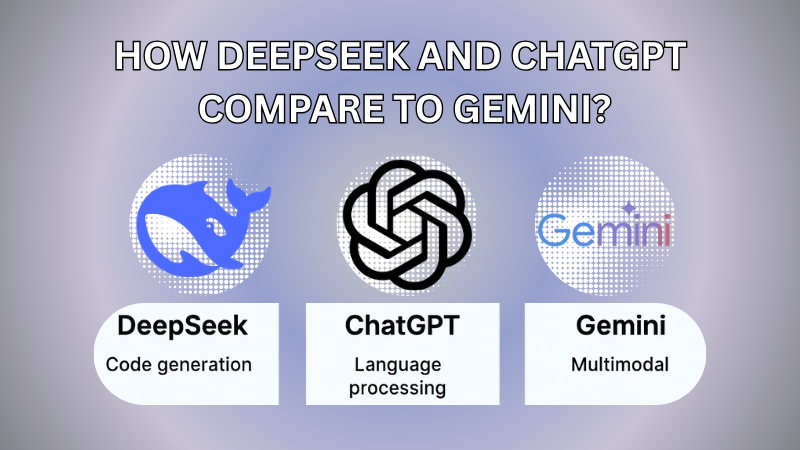DeepSeek vs. ChatGPT: Choosing the Best AI for 2025
As AI technology advances quickly, choosing between leading models like DeepSeek and ChatGPT is becoming more challenging for businesses and individuals.
This comprehensive comparison examines both platforms’ capabilities, specializations, and practical applications to help you determine which AI solution best aligns with your needs in 2025.
What are the Differences Between DeepSeek and ChatGPT?
The choice between DeepSeek and ChatGPT depends on whether you prioritize technical precision (DeepSeek) or conversational versatility (ChatGPT).
| Feature | DeepSeek | ChatGPT |
|---|---|---|
| Key Strengths | Superior in coding and mathematical reasoning | Strong in general knowledge and creative content |
| Open-Source | Partially open-source, offering more flexibility for developers | Closed-source, with continuous updates and improvements |
| Best For | Technical users and developers | General users seeking conversational AI |
| User Experience | More customizable, technical-focused | Refined and easy-to-use |
| Ideal Use Case | Complex coding, technical tasks | General knowledge, creative writing, conversations |
DeepSeek vs. ChatGPT: Which is Better for Coding?
In 2025, DeepSeek outperforms ChatGPT in coding tasks. The DeepSeek R1 model is built specifically for generating code, making it faster and more accurate with complex programming challenges. ChatGPT has improved over time, but DeepSeek remains the better choice for technical coding and algorithmic problem-solving.
How Do DeepSeek and ChatGPT Compare in Conversational AI and Brainstorming?
Both DeepSeek and ChatGPT are great at conversational AI but have different strengths. DeepSeek is excellent for technical tasks and code generation, providing accurate solutions for specific problems.
ChatGPT, on the other hand, is great at brainstorming and idea generation, making it ideal for creative and general conversations.
Which one to choose depends on your needs: DeepSeek is best for technical work, while ChatGPT is better for general conversations and coming up with ideas.
In software engineering, DeepSeek is good at improving code and finding bugs. For data science, it helps recognize patterns and detect issues, which is useful for predictive modeling and solving complex problems across different areas.
ChatGPT vs. DeepSeek: Conversational Abilities
ChatGPT excels in natural conversation, maintaining context and coherence in long exchanges. It is great for casual dialogue and brainstorming, offering human-like responses with good tone and contextual awareness.
DeepSeek, on the other hand, is stronger in technical discussions and problem-solving. It provides precise, accurate responses, especially in specialized fields, but struggles with nuanced conversations and creativity.
Brainstorming and Creative Tasks: ChatGPT leads in generating ideas and creative content, while DeepSeek is more suited for technical problem-solving. ChatGPT handles extended conversations better, offering more fluid exchanges.
Strengths in Technical Tasks
DeepSeek excels in coding, mathematics, and technical problem-solving, providing precise and efficient solutions. While ChatGPT is strong in general conversations and creative content, DeepSeek is more suited for complex programming and specialized technical tasks.
Cost and Accessibility: DeepSeek vs. ChatGPT
When comparing DeepSeek and ChatGPT for cost and accessibility, there are key differences. DeepSeek offers more affordable pricing, with a competitive free tier that is appealing for budget-conscious users.
On the other hand, ChatGPT follows a subscription-based model through OpenAI’s Plus membership, providing enhanced features at a higher cost. It also offers better enterprise integration capabilities.
In terms of global accessibility, ChatGPT is widely available across various regions, while DeepSeek may face restrictions in certain areas, limiting its reach despite its cost-effectiveness.
Is DeepSeek More Cost-Effective Than ChatGPT?
When comparing DeepSeek and ChatGPT, cost and accessibility are important factors. DeepSeek is more affordable, with some versions available as open-source, which can lower costs for organizations with technical expertise.
ChatGPT has a tiered pricing model, which may be expensive for individual users. However, it offers an easier-to-use interface, making it more accessible to people with varying technical skills.
Choosing between the two depends on your organization’s budget, resources, and technical abilities.
Availability and Access: How ChatGPT and DeepSeek Differ
DeepSeek offers open-source options that can lower costs, making it a good choice for organizations looking to save on deployment. It also allows more flexibility for technical users, as it can be downloaded and customized for on-premises use.
ChatGPT, on the other hand, operates on a subscription-based model with tiered pricing. It is accessible through web and mobile apps, but users have less control over the infrastructure.
Organizations should consider their specific needs, such as budget, privacy requirements, and available technical expertise, when choosing between the two.
How DeepSeek and ChatGPT Compare to Gemini?
DeepSeek and ChatGPT excel in language processing and contextual understanding, outperforming newer models like Gemini in complex tasks.

While Gemini stands out for its multimodal integration, DeepSeek shines in code generation and technical fields, making each model valuable in different AI areas.
DeepSeek vs. ChatGPT vs. Gemini 2.0 Flash: A Detailed Comparison
Below, we take a look at how DeepSeek, ChatGPT, and Gemini 2.0 Flash compare in different areas of AI.
| Feature | DeepSeek | ChatGPT | Gemini 2.0 Flash |
|---|---|---|---|
| Specialization | Code generation, technical domains | Natural language processing | Multimodal integration, speed |
| Contextual Understanding | Excellent for complex technical tasks | Superior in language comprehension | Efficient, less focus on context |
| Processing Speed | High, for technical tasks | Fast for conversations | Very fast, optimized for efficiency |
| Multimodal Capabilities | Limited to text | Primarily text-based | Advanced multimodal (text, image, etc.) |
| Strength | Technical precision and coding | Versatility in language tasks | Speed and multimodal performance |
Where DeepSeek and ChatGPT Stand Among Competitors
DeepSeek has become a strong competitor to models like ChatGPT and Google’s Bard. Open-source platforms like Hugging Face have made AI more accessible, while specialized models like IBM Watson focus on industries like healthcare.
ChatGPT remains popular in business, especially for customer service and content creation. However, DeepSeek, with its multilingual capabilities and faster processing, is catching up.
AI is shifting towards multimodal systems, like OpenAI’s DALL-E, that handle text, images, and video. Systems meeting regulatory standards, such as in finance, now have a key advantage.
Which AI Model Is Better for Specific Business and Professional Needs?
When selecting AI models for business needs, consider your specific requirements carefully. For instance, GPT-4 excels at complex reasoning and creative content, while Claude offers strong contextual understanding with greater transparency.
If your needs extend into the realm of AIoT (Artificial Intelligence of Things), you’ll want to evaluate models that handle the integration of AI capabilities with IoT systems.
In these scenarios, platforms capable of real-time decision-making and efficient data processing are critical. In contrast, specialized models like DALL-E focus on image generation, while Gemini brings multimodal capabilities for diverse applications.
Ultimately, the best choice depends on your industry, use case, and particular requirements for accuracy, speed, and cost efficiency.
When to Choose ChatGPT Over DeepSeek
ChatGPT excels in customer service scenarios where natural conversation and contextual understanding are paramount. It demonstrates superior performance in content creation tasks requiring creative output and brand voice consistency.
For multilingual enterprises, ChatGPT offers more robust support across diverse languages compared to DeepSeek. Additionally, organizations with integration requirements benefit from ChatGPT’s extensive API ecosystem and established enterprise support infrastructure.
When regulatory compliance and consistent outputs are critical business requirements, ChatGPT’s more mature content filtering and safety features provide advantages for risk-averse enterprises.
DeepSeek vs. ChatGPT: Final Thoughts
Choosing between DeepSeek and ChatGPT depends on your needs. If your focus is on technical tasks like coding and specialized problem-solving, DeepSeek offers precision and flexibility, especially for developers.
On the other hand, ChatGPT is perfect for general conversations, content creation, and brainstorming, with its user-friendly interface and strong natural language processing.
Consider your budget, resources, and the type of tasks you need the AI to perform before making your choice. Both models excel in different areas, so choose the one that best fits your business needs.
FAQs: DeepSeek vs. ChatGPT
DeepSeek excels in technical tasks like coding and problem-solving, while ChatGPT is better for general conversations and creative tasks.
DeepSeek is better for coding, as it is designed specifically for generating code and handling complex programming tasks.
DeepSeek AI offers free access with some features, but certain advanced options may require a paid plan.
Yes, DeepSeek AI is safe to use, but like any AI tool, it’s important to follow security best practices when implementing it in your projects.
Yes, DeepSeek AI is open-source, meaning developers can customize it for their specific needs.
Yes, DeepSeek AI can be optimized to run on NVIDIA hardware for faster processing and better performance.




